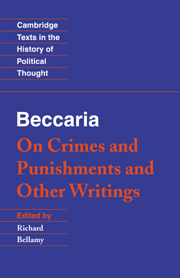Book contents
- Frontmatter
- Contents
- Acknowledgements
- Introduction
- Chronology
- Biographical glossary
- Note on the texts
- Bibliographical note
- On Crimes and Punishments
- Frontispiece
- To the Reader
- Introduction
- 1 The origin of punishment
- 2 The right to punish
- 3 Consequences
- 4 The interpretation of the laws
- 5 The obscurity of the laws
- 6 The proportion between crimes and punishments
- 7 Errors in the measuring of punishments
- 8 The classification of crimes
- 9 Of honour
- 10 Of duels
- 11 Public peace
- 12 The purpose of punishment
- 13 Of witnesses
- 14 Evidence and forms of judgement
- 15 Secret denunciations
- 16 Of torture
- 17 Of the exchequer
- 18 Of oaths
- 19 Of prompt punishments
- 20 Violent crimes
- 21 The punishment of the nobility
- 22 Theft
- 23 Public disgrace
- 24 Parasites
- 25 Banishment and confiscations
- 26 Family feeling
- 27 Lenience in punishing
- 28 The death penalty
- 29 Of detention awaiting trial
- 30 Trials and prescriptions
- 31 Crimes difficult to prove
- 32 Suicide
- 33 Smuggling
- 34 Of debtors
- 35 Asylums
- 36 On setting a price on men's heads
- 37 Attempted crimes, accomplices and immunity
- 38 Leading interrogations, depositions
- 39 Of a particular kind of crime
- 40 False ideas of utility
- 41 How to prevent crimes
- 42 The sciences
- 43 Magistrates
- 44 Public awards
- 45 Education
- 46 Pardons
- 47 Conclusion
- To Jean Baptiste d'Alembert
- To André Morellet
- Inaugural Lecture
- Reflections on the Barbarousness and the Civilisation of Nations and on the Savage State of Man
- Reflections on Manners and Customs
- On Luxury
- Index
- Cambridge Texts in the History of Political Thought
8 - The classification of crimes
Published online by Cambridge University Press: 05 June 2012
- Frontmatter
- Contents
- Acknowledgements
- Introduction
- Chronology
- Biographical glossary
- Note on the texts
- Bibliographical note
- On Crimes and Punishments
- Frontispiece
- To the Reader
- Introduction
- 1 The origin of punishment
- 2 The right to punish
- 3 Consequences
- 4 The interpretation of the laws
- 5 The obscurity of the laws
- 6 The proportion between crimes and punishments
- 7 Errors in the measuring of punishments
- 8 The classification of crimes
- 9 Of honour
- 10 Of duels
- 11 Public peace
- 12 The purpose of punishment
- 13 Of witnesses
- 14 Evidence and forms of judgement
- 15 Secret denunciations
- 16 Of torture
- 17 Of the exchequer
- 18 Of oaths
- 19 Of prompt punishments
- 20 Violent crimes
- 21 The punishment of the nobility
- 22 Theft
- 23 Public disgrace
- 24 Parasites
- 25 Banishment and confiscations
- 26 Family feeling
- 27 Lenience in punishing
- 28 The death penalty
- 29 Of detention awaiting trial
- 30 Trials and prescriptions
- 31 Crimes difficult to prove
- 32 Suicide
- 33 Smuggling
- 34 Of debtors
- 35 Asylums
- 36 On setting a price on men's heads
- 37 Attempted crimes, accomplices and immunity
- 38 Leading interrogations, depositions
- 39 Of a particular kind of crime
- 40 False ideas of utility
- 41 How to prevent crimes
- 42 The sciences
- 43 Magistrates
- 44 Public awards
- 45 Education
- 46 Pardons
- 47 Conclusion
- To Jean Baptiste d'Alembert
- To André Morellet
- Inaugural Lecture
- Reflections on the Barbarousness and the Civilisation of Nations and on the Savage State of Man
- Reflections on Manners and Customs
- On Luxury
- Index
- Cambridge Texts in the History of Political Thought
Summary
We have seen what the true measure of crimes is, namely, harm to society. This is one of those palpable truths which, though they call for neither quadrants nor telescopes to be discovered, but are within the grasp of the average intelligence, nevertheless have, by a curious conjunction of circumstances, only been firmly recognised by a few thinkers in every nation and in every century. But opinions worthy only of Asiatic despots and emotions robed in authority and power have blotted out, mainly by unfelt pressures but sometimes by violent impressions affecting the timid credulity of men, the simple ideas, which perhaps shaped the first philosophy of those youthful societies, and to which the enlightenment of the present century seems to be leading us back, with that greater conviction that results from a rigorous analysis, from a thousand unhappy experiences and the very obstacles themselves.
It would now seem appropriate to examine and to distinguish all the various sorts of crimes and the ways of punishing them, if it were not for the fact that this would demand immense and tedious detail because of the variations caused by the differing circumstances of differing times and places. But it will be enough to point out the most general principles and the most baneful and common mistakes to correct both those who, from a misguided love of freedom, would wish to introduce anarchy, and those who would like to reduce men's lives to monastic regularity.
- Type
- Chapter
- Information
- Beccaria: 'On Crimes and Punishments' and Other Writings , pp. 24 - 25Publisher: Cambridge University PressPrint publication year: 1995



